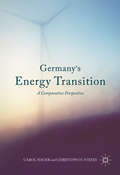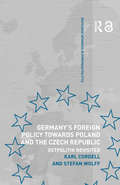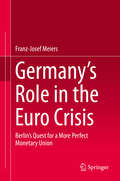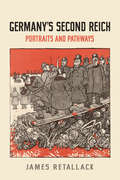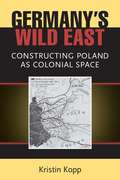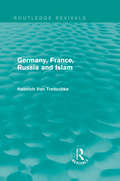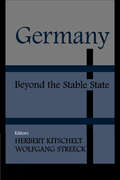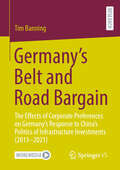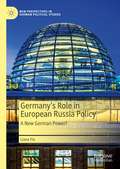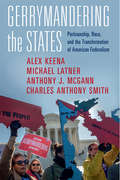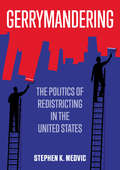- Table View
- List View
Germany's Energy Transition
by Carol Hager Christoph H. StefesThis book analyzes Germany's path-breaking Energiewende, the country's transition from an energy system based on fossil and nuclear fuels to a sustainable energy system based on renewables. The authors explain Germany's commitment to a renewable energy transition on multiple levels of governance, from the local to the European, focusing on the sources of institutional change that made the transition possible. They then place the German case in international context through comparative case studies of energy transitions in the USA, China, and Japan. These chapters highlight the multifaceted challenges, and the enormous potential, in different paths to a sustainable energy future. Taken together, they tell the story of one of the most important political, economic, and social undertakings of our time.
Germany's Foreign Policy Towards Poland and the Czech Republic: Ostpolitik Revisited (Routledge Advances in European Politics #Vol. 28)
by Stefan Wolff Karl CordellThis is a new exploration of how the events of the twentieth century still cast a shadow over relations between Germany, Poland and the Czech Republic.Using social constructivism theory, it provides a comparative assessment of Germany's post-reunification relations with the Czech Republic and Poland within the framework of the contemporary alliance structure. Identifying the key actors and factors, Cordell and Wolff examine the long-standing continuity in the norms and values that underpin German foreign policy and explore the issues of borders, territory, identities, minorities and population transfers. Paying particular attention to the process of European integration and the role of the new Germany within Europe, the authors identify how new possibilities for co-operation might finally overcome legacies of the past. This pioneering study will be of particular interest to students of European politics and international studies.
Germany's Hidden Crisis: Social Decline in the Heart of Europe
by Oliver NachtweyAn excellent study of how neoliberalism is causing a crisis in GermanyOne of the German-speaking world's leading young sociologists lays out modern Germany's social and political crisis and its implications for the future of the European hegemon. Upward social mobility represented a core promise of life under the "old" West German welfare state, in which millions of skilled workers upgraded their VWs to Audis, bought their first homes, and sent their children to university. Not so in today's Federal Republic, however, where the gears of the so-called "elevator society" have long since ground to a halt. In the absence of the social mobility of yesterday, widespread social exhaustion and anxiety have emerged across mainstream society. Oliver Nachtwey analyses the reasons for this social rupture in post-war German society and investigates the conflict potential emerging as a result, concluding that although the country has managed to muddle through the Eurocrisis largely unscathed thus far, simmering tensions beneath the surface nevertheless threaten to undermine the German system's stability in the years to come.
Germany's Role in the Euro Crisis
by Franz-Josef MeiersThis book analyses Germany's role in the euro crisis. Based on the perception of Berlin as the emerging capital of the European Union, the author investigates three interrelated issues: Did the German policy approach of imposing austerity programs on countries in the middle of a deep recession contribute to the successful management of the euro crisis? Does Germany extend its sway over its European partners by forcing them to surrender to the German diktat of fiscal Disziplin and economic efficiency? Is the stubborn insistence on rigid fiscal adjustment another ominous sign of the Berlin Republic moving away from the country's traditional European vocation toward an imperial leadership role? The book's main argument is that Germany's role in and responses to the euro crisis can best be explained by different concepts of self, historical memory, and institutional practices.
Germany's Second Reich
by James RetallackDespite recent studies of imperial Germany that emphasize the empire's modern and reformist qualities, the question remains: to what extent could democracy have flourished in Germany's stony soil? In Germany's Second Reich, James Retallack continues his career-long inquiry into the era of Bismarck and Kaiser Wilhelm II with a wide-ranging reassessment of the period and its connections with past traditions and future possibilities.In this volume, Retallack reveals the complex and contradictory nature of the Second Reich, presenting Imperial Germany as it was seen by outsiders and insiders as well as by historians, political scientists, and sociologists ever since.
Germany's Vision of Empire in Venezuela: 1871-1914
by Holger HerwigThe author details Imperial Germany's interests in Venezuela (and all South America) from the ascension of Wilhelm II to the outbreak of WWI.
Germany's War and the Holocaust: Disputed Histories
by Omer BartovWhile attempts to come to terms with past catastrophe . . . can help prevent its recurrence, they may also provide arguments for . . . actions against the real or imagined perpetrators of previous disasters. The confrontation with . . . catastrophe can help us understand the roots and nature of this century's destructive urges, as well as humanity's extraordinary recuperative capacities; but it can also legitimize the perpetuation of violence and aggression. -from the Introduction Omer Bartov, a leading scholar of the Wehrmacht and the Holocaust, provides a critical analysis of various recent ways to understand the genocidal policies of the Nazi regime and the reconstruction of German and Jewish identities in the wake of World War II. Germany's War and the Holocaust both deepens our understanding of a crucial period in history and serves as an invaluable introduction to the vast body of literature in the field of Holocaust studies. Drawing on his background as a military historian to probe the nature of German warfare, Bartov considers the postwar myth of army resistance to Hitler and investigates the image of Blitzkrieg as a means to glorify war, debilitate the enemy, and hide the realities of mass destruction. The author also addresses several new analyses of the roots and nature of Nazi extermination policies, including revisionist views of the concentration camps. Finally, Bartov examines some paradigmatic interpretations of the Nazi period and its aftermath: the changing American, European, and Israeli discourses on the Holocaust; Victor Klemperer's view of Nazi Germany from within; and Germany's perception of its own victimhood.
Germany's Wild East: Constructing Poland as Colonial Space
by Kristin KoppIn the nineteenth and early twentieth centuries, representations of Poland and the Slavic East cast the region as a primitive, undeveloped, or empty space inhabited by a population destined to remain uncivilized without the aid of external intervention. These depictions often made direct reference to the American Wild West, portraying the eastern steppes as a boundless plain that needed to be wrested from the hands of unruly natives and spatially ordered into German-administrated units. While conventional definitions locate colonial space overseas, Kristin Kopp argues that it was possible to understand both distant continents and adjacent Eastern Europe as parts of the same global periphery dependent upon Western European civilizing efforts. However, proximity to the source of aid translated to greater benefits for Eastern Europe than for more distant regions.
Germany, France, Russia and Islam (Routledge Revivals)
by Heinrich Von TreitschkeHeinrich Von Treitschke was a prolific German historian and political writer during the nineteenth century. In Germany, France, Russia and Islam, first published in 1915, he considers European diplomatic relations from the patriotic perspective of imperial Germany, in particular examining Germany’s relationship to Turkey and France. This is a fascinating classic work, which will be of great value to academics and students interested in nineteenth-century European politics and history.
Germany, Poland and the Common Security and Defence Policy
by Laura ChappellA comparative analysis of an old and new EU Member State's perceptions of and contributions to EU security and defence. This book focuses on change and continuity in both countries' defence policies and where convergence and divergence has occurred. This has important implications for the EU's effectiveness as an international security actor.
Germany, Poland, and Postmemorial Relations
by Kristin Kopp Joanna NiżyńskaCovering the period following the collapse of communism, the unification of Germany, and Poland's accession to the EU, this collection focuses on the interdependencies of German, Polish, and Jewish collective memories and their dialogic, transnational character, showing the collective nature of postmemory and the pressures that shape it.
Germany: Beyond the Stable State (Studies In Political Economy Ser.)
by Wolfgang Streeck Herbert KitscheltFrom the 1960s to the 1980s, observers gave the name "Model Germany" to the Federal Republic. They saw in Germany a political-economic "model" that was able to weather many economic challenges. "Model Germany" permitted political competition, while coordinating public policy among interest associations and private businesses so that changes would only take place only in a balanced and positive way.Since the early 1990s this "German Model" has faced serious troubles. Authors in this book describe its disintegration in the past decade and probe into the causes of this. Articles argue that it is Germany's national and European integration that has triggered the model's unravelling.These processes are paralleled by tendencies in public opinion, social life styles, and political mobilization in parties, interest groups, and social movements. The strains of "model Germany" show up in the transformation of industrial relations, corporate governance structures, and social and immigration policies in Germany.
Germany: Geographies of Complexity (World Regional Geography Book Series)
by Olaf Kühne Florian WeberThis book addresses the highly differentiated spatial, social, cultural and demographic structure(s) of Germany, with a particular focus on the reciprocal relations between different levels of spatial development. The historical development of Germany serves as a background in order to provide context for the development of spatially relevant ideas and ideals (whether in relation to politics, landscape, or culture). In this regard, questions of divergence and convergence become highly salient. The book makes the complexity of spatial and social developments in Germany comprehensible. The neopragmatic approach adopted here allows bringing together different theoretical strands while providing a basis for independent regional geographic research at the same time. Beginning with an overview of the physical structures of Germany which provides the material point of departure for the societal development of Germany, key aspects of the German history are discussed. Particular attention is paid to the reciprocal influence between material substrate and notions of landscape. Here, specific ‘German’ trajectories of aesthetic and normative conceptions of landscape become clear. A common theme throughout the book are questions of divergence and of efforts towards convergence, which become evident when considering past and present economic, political, and demographic developments. Efforts to tackle current challenges, such as adapting to climate change and mitigating it, or securing raw materials, also become apparent. The complexity of spatial processes in Germany is illustrated in case study regions dealing with the challenges of structural change in traditional industrial regions (such as the Ruhr area), or e.g. efforts of Berlin to position and find itself as the capital of a unified Germany. Overall, the book shows how theory-driven regional geographic research can make spatiotemporal complexities tangible and comprehensible.
Germany’s Belt and Road Bargain: The Effects of Corporate Preferences on Germany’s Response to China’s Politics of Infrastructure Investments (2013 – 2021)
by Tim BanningIn recent years, the Belt and Road Initiative (BRI) has not only transformed global trade relations but also tested Germany’s political strategies. This book explores the German Federal Government’s ambivalent response to China’s politics of infrastructure investments under the BRI during Angela Merkel’s tenure as Chancellor, raising crucial questions about Germany’s bilateral relations with China, its economic ambition, and its geopolitical responsibility. This book provides a detailed account of the key political processes and decision points that influenced the Federal Government’s stance towards China’s politics of infrastructure investments. Through its analysis of the interactions between domestic politics and international relations, it aims to offer a nuanced understanding of the complex dynamics between the state and business. It examines how the varying interests of numerous industry sectors impacted the Federal Government’s response to China’s politics of infrastructure investments across multiple policy domains, covering Germany’s policy on foreign investments and foreign trade, its industrial policy, its broader foreign policy, and its role in European politics.
Germany’s Economic
by Jack EwingIn Germany's Economic Renaissance, veteran European correspondent Jack Ewing of The International New York Times explains how a country with some of the highest labor and energy costs in the world beat the odds to become the third-largest exporter of manufactured goods, after China and the United States. Men and women who manage German companies both big and small explain how any company can behave like a multinational, as well as the secrets of conquering the high end of the market where quality is more important than price. Both informative and entertaining, filled with rich character studies, this book is essential reading for everyone wondering how to bring factories - and the jobs they provide - back to American shores.
Germany’s Empire in the East: Germans and Romania in an Era of Globalization and Total War
by David HamlinThis book puts German policy toward Romania and the German East into a global context. One of the signal events of the twentieth century was Germany's effort to construct an empire in Europe modeled on the European experience outside Europe. The turn to European empire resulted less from the dynamics of capitalist expansion than from a deep crisis in global political and economic order. Confronted with the global economic and political power of the western allies, the Germans turned to Eastern Europe to construct a dependent space, tied to Germany as Central America was to the US. The First World War transformed how Germans thought about international order, empire and the nature of Romanians. The domestic consequences of Germany's eviction from global markets authorized deep interventions in Romanian society to establish a pre-eminent position for the German state inside Romania. David Hamlin embeds occupation and war aims in economic concerns.
Germany’s Role in European Russia Policy: A New German Power? (New Perspectives in German Political Studies)
by Liana FixThis book contributes to the debate about a new German power in Europe with an analysis of Germany’s role in European Russia policy. It provides an up-to-date account of Germany’s “Ostpolitik” and how Germany has influenced EU-Russia relations since the Eastern enlargement in 2004 - partly along, partly against the interests and preferences of new member states. The volume combines a rich empirical analysis of Russia policy with a theory-based perspective on Germany’s power and influence in the EU. The findings demonstrate that despite Germany’s central role, exercising power within the EU is dependent on legitimacy and acceptance by other member states.
Germany’s War Debt to Greece: A Burden Unsettled
by Nicos ChristodoulakisThe book chronicles the Occupation Loan that was forcibly obtained by the Third Reich from the Greece in 1942-1944 and demonstrates why Greece's claim for the repayment of the loan is still valid. To overcome the absence of a normal debt agreement between the two countries, various assessments of its current value are presented and discussed.
Germinal
by Emile Zola Peter Collier Robert LethbridgeZola's masterpiece of working life, Germinal (1885), exposes the inhuman conditions of miners in northern France in the 1860s. By Zola's death in 1902 it had come to symbolize the call for freedom from oppression so forcefully that the crowd which gathered at his State funeral chanted 'Germinal! Germinal!' The central figure, Etienne Lantier, is an outsider who enters the community and eventually leads his fellow miners in a strike protesting against pay-cuts - a strike which becomes a losing battle against starvation, oppression, and sabotage. Yet despite all the violence and disillusion which rocked the mining community to its foundations, Lantier retains his belief in the ultimate germination of a new society, leading to a better world.
Germs, Seeds and Animals: Studies in Ecological History
by Alfred W. CrosbyThis book is the first comprehensive introduction to contemporary Turkmenistan in English.
Gerrymandering in America
by Smith Mcgann Anthony J. Charles Anthony Michael Latner Alex KeenaThis book considers the political and constitutional consequences of Vieth v. Jubelirer (2004), where the Supreme Court held that partisan gerrymandering challenges could no longer be adjudicated by the courts. Through a rigorous scientific analysis of US House district maps, the authors argue that partisan bias increased dramatically in the 2010 redistricting round after the Vieth decision, both at the national and state level. From a constitutional perspective, unrestrained partisan gerrymandering poses a critical threat to a central pillar of American democracy, popular sovereignty. State legislatures now effectively determine the political composition of the US House. The book answers the Court's challenge to find a new standard for gerrymandering that is both constitutionally grounded and legally manageable. It argues that the scientifically rigorous partisan symmetry measure is an appropriate legal standard for partisan gerrymandering, as it logically implies the constitutional right to individual equality and can be practically applied.
Gerrymandering the States: Partisanship, Race, and the Transformation of American Federalism
by Charles Anthony Smith Michael Latner Alex Keena Anthony J. McGannState legislatures are tasked with drawing state and federal districts and administering election law, among many other responsibilities. Yet state legislatures are themselves gerrymandered. This book examines how, why, and with what consequences, drawing on an original dataset of ninety-five state legislative maps from before and after 2011 redistricting. Identifying the institutional, political, and geographic determinants of gerrymandering, the authors find that Republican gerrymandering increased dramatically after the 2011 redistricting and bias was most extreme in states with racial segregation where Republicans drew the maps. This bias has had long-term consequences. For instance, states with the most extreme Republican gerrymandering were more likely to pass laws that restricted voting rights and undermined public health, and they were less likely to respond to COVID-19. The authors examine the implications for American democracy and for the balance of power between federal and state government; they also offer empirically grounded recommendations for reform.
Gerrymandering: The Politics of Redistricting in the United States
by Stephen K. MedvicFor nearly as long as there have been electoral districts in America, politicians have gerrymandered those districts. Though the practice has changed over time, the public reaction to it has remained the same: gerrymandering is reviled. There is, of course, good reason for that sentiment. Gerrymandering is intended to maximize the number of legislative seats for one party. As such, it is an attempt to gain what appears to be an unfair advantage in elections. Nevertheless, gerrymandering is not well understood by most people and this lack of understanding leads to a false sense that there are easy solutions to this complex problem. Gerrymandering: The Politics of Redistricting in the United States unpacks the complicated process of gerrymandering, reflecting upon the normative issues to which it gives rise. Tracing the history of partisan gerrymandering from its nineteenth-century roots to the present day, the book explains its legal status and implementation, its consequences, and possible options for reform. The result is a balanced analysis of gerrymandering that acknowledges its troubling aspects while recognizing that, as long as district boundaries have to be drawn, there is no perfect way to do so.
Gerónimo de Uztáriz and his Economic Work: New Politics and the Origins of the Science of Commerce in 18th Century Europe (Palgrave Studies in the History of Economic Thought)
by Jesús Astigarraga Niccolò GuastiThis book provides a detailed and compelling guide to the life and economic work of Gerónimo de Uztáriz. It contextualises his work within the economic and political trends of the time, including the Enlightenment, Spanish liberalism, and colonial empires. Particular attention is given to de Uztáriz’s seminal work Theórica y Práctica de comercio y de marina and how it achieved international circulation and recognition. Its influence on 18th century Spain is examined, alongside a detailed analysis of the trade systems of the day. The translation and reception of Theórica in France, Great Britain, Italy, Ireland, and Germany is also discussed. This book aims to shed new light upon the economic work of Gerónimo de Uztáriz and highlights why his ideas remain relevant and important. It will be of interest to students and researchers working within modern history and the history of economic thought.
Gesamtenergiesystem der Zukunft: Sektorenkopplung durch Strom und Wasserstoff (essentials)
by Zbigniew A. Styczynski Przemyslaw Komarnicki Michael KranholdDas essential gibt in kompakter Form einen Überblick über die Genese und die bisherigen Umsetzungsschritte der Energiewende und beschreibt insbesondere die Rahmenbedingungen des sich wandelnden Energiesystems. Damit eignet sich das Buch hervorragend als Einstiegslektüre in die Thematik der Energiewende, die auch zur Entstehung eines holistischen Gesamtenergiesystems führen wird.
